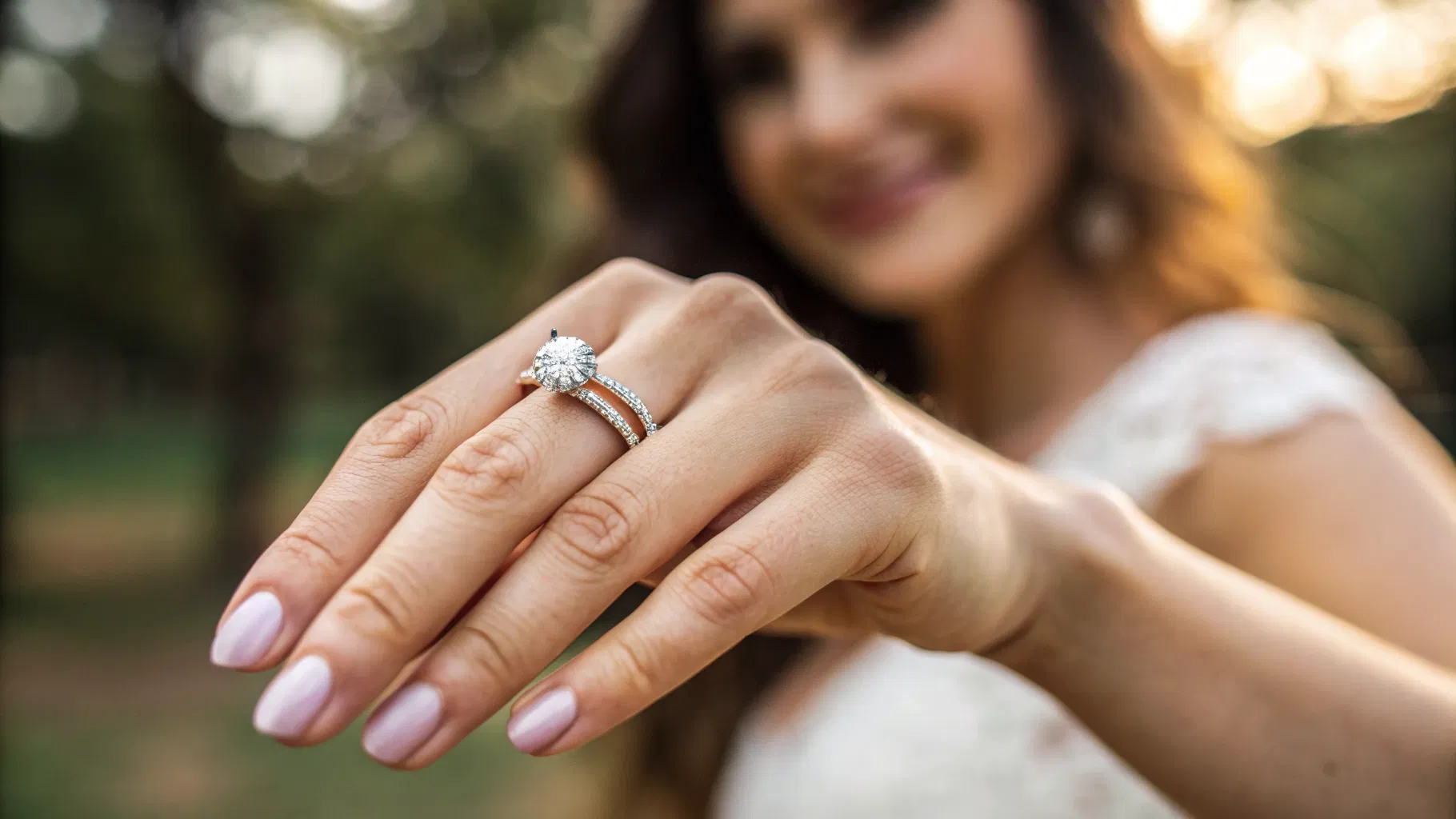
Can You Be Allergic to Gold Earrings? Understanding Jewelry Allergies and How to Choose Safely
Introduction
Can true luxury also be truly ethical? As we navigate a world increasingly focused on sustainability and personal expression, many of us are seeking jewelry that reflects our values and individual stories. Whether it’s a stunning pair of diamond earrings or a custom-designed piece that encapsulates your unique journey, the allure of fine jewelry is undeniable. However, for some, the joy of wearing beautiful pieces can be overshadowed by the discomfort of allergic reactions to metals, particularly gold.
In this comprehensive guide, we will explore the question, "Can you be allergic to gold earrings?" and delve into the intricacies of jewelry allergies, their symptoms, causes, and how to choose pieces that are both luxurious and safe. At DiamondsByUK, we are committed to redefining luxury by making sustainable, conflict-free diamond jewelry accessible to all. This commitment extends to ensuring that our customers can find beautiful, ethical jewelry that they can wear with confidence and comfort.
Are you dreaming of a piece of jewelry that’s as unique as your story? Join us as we navigate the fascinating world of jewelry allergies, explore the benefits of lab-grown diamonds, and highlight our dedication to craftsmanship, sustainability, and customer satisfaction.
Understanding Jewelry Allergies
Jewelry allergies, particularly to metals like gold, are more common than one might think. While many people can wear jewelry without issue, a significant portion of the population experiences allergic reactions due to the metals used in their favorite pieces. Here, we will delve into the specifics of gold allergies, including symptoms, causes, and how to manage them.
What Is a Jewelry Allergy?
A jewelry allergy, or allergic contact dermatitis, occurs when the skin reacts to certain metals or other materials in jewelry. This reaction can manifest as redness, itching, swelling, or even blistering at the site of contact. The most common culprits in jewelry allergies are nickel, cobalt, and, in some cases, gold.
Symptoms of a Gold Allergy
If you suspect you may have a gold allergy, it’s essential to recognize the symptoms. Common reactions include:
- Redness: A localized rash or redness at the site of contact.
- Itching: Intense itchiness can lead to discomfort and scratching.
- Swelling: The affected area may become swollen or inflamed.
- Blistering: In severe cases, blisters may form.
- Peeling or Flaking: The skin may begin to peel or flake as a result of irritation.
Symptoms can vary in severity and may occur immediately after wearing the jewelry or develop over time with repeated exposure.
Causes of Gold Allergies
While gold itself is generally considered hypoallergenic, many gold jewelry pieces contain alloys that include nickel or other metals, which are common allergens. Here are some key points to understand:
- Alloy Composition: Gold jewelry is often alloyed with other metals to improve its strength and durability. For example, white gold typically contains nickel, which can trigger allergic reactions in sensitive individuals.
- Nickel Allergy: Many people who are allergic to gold may actually be allergic to nickel, which is frequently found in lower karat golds and white gold.
- Concentration of Alloys: The karat of gold also plays a role in its allergenic potential. Higher karat gold (like 18K and 24K) has less alloy and is less likely to cause allergic reactions compared to lower karat gold (like 10K or 14K).
How Is a Gold Allergy Diagnosed?
Diagnosis of a gold allergy typically involves a thorough medical history and physical examination by a healthcare professional. A dermatologist may perform a patch test, which involves applying a small amount of gold sodium thiosulfate to the skin to observe for any allergic reactions.
Managing a Gold Allergy
If you suspect you have a gold allergy, here are some steps to take:
- Remove the Jewelry: The first step is to discontinue wearing any gold jewelry that causes symptoms.
- Use Topical Treatments: Over-the-counter corticosteroid creams can help reduce inflammation and itching.
- Consult a Dermatologist: If symptoms persist or worsen, seeking professional medical advice is crucial for managing the allergy effectively.
- Consider Alternative Materials: Opting for hypoallergenic or nickel-free options, such as high-karat gold, platinum, or titanium, can help avoid allergic reactions.
Choosing Gold Jewelry Safely
Understanding your skin's sensitivity is vital when choosing gold jewelry. Here are some tips for selecting pieces that minimize the risk of allergic reactions:
Opt for Higher Karat Gold
- 24K Gold: This is nearly pure gold and contains very little alloy, making it the least likely to cause allergic reactions.
- 18K Gold: While still containing some alloy, it has a higher concentration of gold than lower karat options, reducing the risk of allergy.
Look for Hypoallergenic Options
- Nickel-Free Gold: Many jewelers offer nickel-free options or specifically label pieces as hypoallergenic. Always check the specifications before purchasing.
- Lab-Grown Diamonds: At DiamondsByUK, we specialize in IGI-certified lab-grown diamonds that are ethically sourced and conflict-free. Explore our stunning Diamond Earrings collection today to find beautiful options that you can wear with confidence.
Custom Design for Unique Needs
If you have specific concerns about allergies or sensitivities, consider customizing your jewelry. At DiamondsByUK, we offer a personalized design service, allowing you to create a unique piece that suits your style and needs. Design Your Bespoke Jewellery with DiamondsByUK today and let us help you bring your vision to life.
Maintenance and Care
Regular maintenance of your jewelry can also prevent allergic reactions. Keeping your pieces clean and free from irritants can help maintain their beauty and ensure they remain comfortable to wear.
The Benefits of Choosing Lab-Grown Diamonds
As we explore jewelry choices, it’s essential to highlight the advantages of lab-grown diamonds. At DiamondsByUK, we are proud to offer stunning, ethically sourced lab-grown diamonds that align with our commitment to sustainability and integrity. Here are some key benefits:
Ethical and Sustainable
Lab-grown diamonds are created through environmentally friendly processes that do not contribute to the ethical concerns associated with mined diamonds. This means you can enjoy your jewelry without compromising on your values.
Affordable Luxury
Lab-grown diamonds typically cost 20-40% less than their mined counterparts, allowing you to invest in higher quality and more intricate designs without breaking the bank.
Customization Options
With lab-grown diamonds, you have the flexibility to customize your jewelry to reflect your personal style. Whether you prefer classic elegance or modern flair, our bespoke design service can help you create the perfect piece. Start Your Custom Design Journey today, often with delivery in just 1–2 weeks.
Conclusion
Being informed about jewelry allergies, particularly to gold, empowers you to make safer and more confident choices in your jewelry selection. Understanding the symptoms, causes, and management strategies is crucial for anyone who has experienced discomfort from wearing gold earrings or other jewelry.
At DiamondsByUK, we are committed to providing beautiful, ethical, and customizable jewelry options that cater to your needs. Our dedication to sustainability, integrity, and craftsmanship means you can shop with us knowing that you are making a responsible choice.
We invite you to explore our stunning Diamond Earrings collection and find the perfect piece that resonates with your story. And if you’re ready to embark on a custom design adventure, Contact Us to Create Your Unique Piece today.
FAQ
1. Can you be allergic to gold earrings? Yes, some individuals can be allergic to gold earrings, often due to the presence of alloys such as nickel.
2. What are the symptoms of a gold allergy? Symptoms can include redness, itching, swelling, and blistering at the site of contact with the jewelry.
3. How can I tell if I have a gold allergy? A dermatologist can perform a patch test to determine if you have a gold allergy or sensitivity.
4. Can I wear gold jewelry if I have a gold allergy? If you have a gold allergy, it is best to avoid wearing gold jewelry or opt for higher karat gold that contains fewer alloys.
5. What are some alternative materials for sensitive skin? Consider hypoallergenic materials such as platinum, titanium, or high-karat gold to avoid allergic reactions.
6. How can I manage a gold allergy? Avoid wearing gold jewelry, use topical treatments for symptoms, and consult a dermatologist for persistent issues.
7. Are lab-grown diamonds a good option for those with allergies? Yes, lab-grown diamonds are often set in hypoallergenic materials, making them a safe and beautiful choice for sensitive skin.
8. How long does it take to create a custom piece? At DiamondsByUK, we typically offer a turnaround time of 1-2 weeks for custom-designed jewelry.
By prioritizing your health and style, you can enjoy a luxurious jewelry experience without the worry of allergic reactions.


